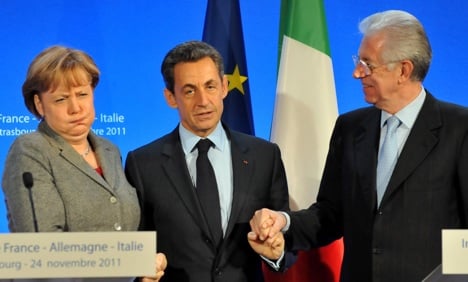With bond market vultures circling even gold-plated economies, and Italy’s La Stampa daily citing IMF officials on a rescue plan worth up to €600 billion ($794 billion), another of Germany’s closest Triple A-rated allies jumped ship on the ECB’s role to leave Berlin isolated.
Amid predictions that the currency faces its death throes within weeks failing radical intervention, Austria joined Finland in backing ECB action to stem financial market contagion threatening Italy, Spain and even France.
The pressure has intensified since Germany itself struggled to raise public finance on commercial money markets, in a potential tipping point for the balance of power within the eurozone on the painful debate about integrating public finance across borders.
“The European Central Bank could perform a more powerful role, as in the United States,” Austrian Prime Minister Werner Faymann said, also giving his support to the creation of commonly-issued eurobonds.
“It could itself buy states’ bonds,” he said on the sidelines of a congress of European Socialist parties in Brussels.
That meant a large-scale ramping up of carefully targeted action on the sell-on, secondary bond market, trying to prevent interest rates for Italy or Spain from skyrocketing to the levels that forced bailouts on Greece, Ireland and Portugal.
The scope for direct ECB action at primary level, as long sought by US, British and other G7 partners among the world’s most powerful economies in an accelerating crisis, will be the unspoken nub of euro finance ministers’ talks on Tuesday night in Brussels.
Finland’s finance minister Jutta Urpilainen said Friday: “I think we have seen that if there is nothing else left then we can think about strengthening the role of the ECB.”
In Strasbourg last week for a mini-summit with France and Italy, German Chancellor Angela Merkel said politicians should not intervene in ECB decision-making.
“The French president has just underlined that the European Central Bank is independent,” she said, but a smiling Sarkozy interjected: “All three of us said that with respect for the independence of this institution, one should refrain from positive or negative demands of the ECB.”
The Financial Times Deutschland interpreted that exchange as proof that France, the most vociferous eurozone backer of a turbo-charged ECB role at the heart of the continent’s politics, was winning the day.
“By committing to silence, Merkel and Sarkozy are freeing the ECB to make a more forceful intervention in the crisis,” it said.
A French government source said pressure has been piled on Merkel for months, citing the meeting alongside new Italian premier Mario Monti and an invitation for US President Barack Obama to join a French-German huddle in Cannes during a G20 summit last month.
“The idea was to point out to Merkel that, even Monti, who is willing to go much further than Berlusconi was in reforming Italy, won’t make it without ECB intervention – the way all other central banks act,” said the source.
The IMF loans, at rates of 4.0 percent or 5.0 percent, would give Monti a window of 12 to 18 months to implement urgent budget cuts and growth-boosting reforms “by removing the necessity of having to refinance the debt,” La Stampa quoted an IMF official as saying.
In Paris, the view is clear: unless Merkel turns completely, not even Germany will be able to stand in the way of market pressures.
It is a position adopted by many economists, the outspoken Jacques Attali going as far in one interview as to say the real question, rather than a threat to France’s Triple A rating, was “will the euro still exist at Christmas?”
Britain’s banks have started drawing up contingency plans for the possible dismantling of the eurozone, a senior official at its Financial Services Authority said last week.
AFP/mry



 Please whitelist us to continue reading.
Please whitelist us to continue reading.
Member comments